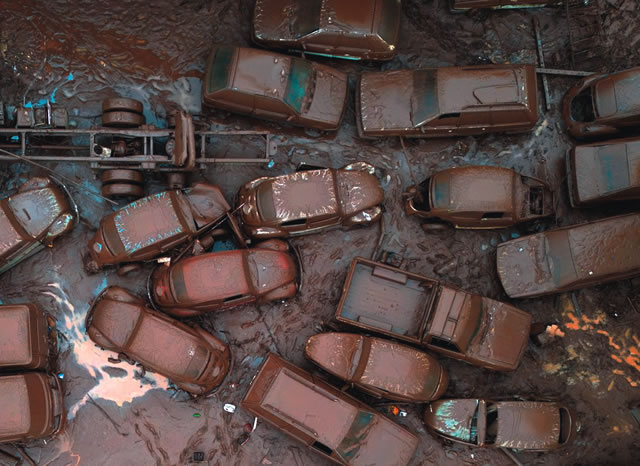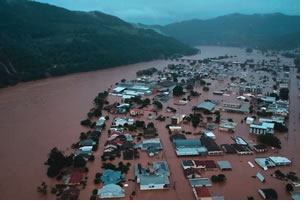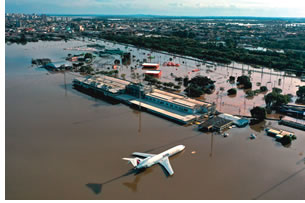
Catastrophic Flooding in Southern Region
At the beginning of May, the state of Rio Grande do Sul (RS), with 11 million inhabitants, was severely hit by heavy, persistent rains. In 15 days, the area received as much rain as typically falls in three months: 520 mm (20.5 in.).
Most of this rain fell within 48 hours. The rivers overflowed their banks, and torrents caused vast destruction. Some cities were 90% destroyed.
 Our state has 496 districts, 446 of which were affected by the floods. More than 150,000 people were forced to leave their homes, some of which were flooded as high as the roof. A total of two million people were
Our state has 496 districts, 446 of which were affected by the floods. More than 150,000 people were forced to leave their homes, some of which were flooded as high as the roof. A total of two million people were
impacted by the catastrophic flooding. The state is roughly the size of Nevada, and the area impacted by the disaster is roughly the size of South Carolina.
The Guaíba (the river near Porto Alegre) rose to 5.56 meters—3 meters beyond its limits, requiring the protective walls at the port to be closed. During our last serious flood in 1941, the water level reached 4.76 m.
110 hospitals were hit. Districts were without running water for days or even weeks, because most of the water pumps collapsed. Only 2 of the 23 in Porto Alegre kept running. The power plant also stopped producing for safety reasons. It was bad for remote towns and villages: They could no longer be reached by phone, so no one knew what was happening there.
 The airport closed on May 3. More than a meter of water ran into the main lobby and over the runways, making the airport resemble a lake. The latest estimate for reopening is December!
The airport closed on May 3. More than a meter of water ran into the main lobby and over the runways, making the airport resemble a lake. The latest estimate for reopening is December!
The main post office building was also underwater, and no mail could be sent for three weeks. And because all the access roads to Porto Alegre were also underwater (with one exception), only relief supplies, police, and ambulances were initially allowed to enter the city. After a few days, a second access road was cleared, followed by a third a bit later. It took more than a month for all of the access roads to be free of water and ready for use again.
Our mission station wasn’t hit by the flooding, because it’s situated in a higher part of the city. But many churches were underwater, including the one we are affiliated with. Some church members lost their houses, and others had to leave their homes because the entrances to their high-rises were underwater. The towns in Vale do Taquarí, which we helped back in September of last year, were hit again. It looked like a war zone then, and it was even worse this time.
The print shop that binds our thicker books was also three meters underwater. But all we lost was our new commentary on Mark, which had been finished and was ready for delivery.
Helping Where We Can
Our church was generously permitted to use a warehouse free of charge. This allowed us to temporarily store and relay many truckloads of relief supplies that came to our state from across the country.
More than 100 dormitories and living halls were set up as emergency accommodation, mostly in schools. Mattresses, blankets, clothing, towels, personal hygiene products, and other items were provided for the more than 70,000 people who were without shelter. Three meals a day also needed to be prepared for them. The Christian churches especially were actively involved in this first phase of assistance. Our mission station provided tracts to distribute with meals or other relief items. Donations have enabled us to buy 5,000 Bibles and 1,000 New Testaments so far, which are being distributed systematically.
Five weeks after the floods began, our town and its neighbors were largely free of water. Now the second phase began: clearing and cleaning up. Everything looks bad enough when it’s covered with water, but once it’s gone, you realize the full extent of the disaster. Most houses had thick layers of mud, clay, and dirt that had to be shoveled out. Then the broken furniture had to be left on the street, before anyone could even think about cleaning. There was rubble and garbage everywhere. It will take months for everything to be cleared away.
Another parallel tragedy is taking place. In the first few days, there were reports of sexual assault in the shelters, including against children. Many people refused to leave their homes for fear of them being looted, and this fear was unfortunately justified. Some were actually approaching houses by boat and offering to help, only to attack and steal from the residents. And those who left their homes later returned to find that they had been robbed. One businessman said in a video that what shocked him most was that the robbers destroyed anything they couldn’t take with them.
God allowed this disaster, and we don’t know why. But His plan is always perfect! The Gaúcho, the people of our state, are very proud of their culture. So, they find it difficult to go to a Christian church, and don’t want to learn anything about the faith. But now many are open to the gospel. They don’t just want a tract; many also ask for a Bible.
Pray with us that the sowing of tracts and Bibles, as well as pastoral conversations, will bear eternal fruit so the name of the Lord is glorified above this tragedy.
Midnight Call - 08/2024





